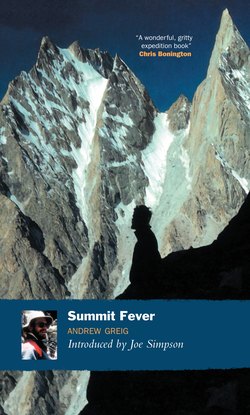Читать книгу Summit Fever - Andrew Greig - Страница 5
Introduction
ОглавлениеIn Summit Fever Andrew Greig, performing poet, musician, and novelist, suddenly finds himself in the role of budding amateur mountaineer on an expedition to the Mustagh Tower in the Karakoram. Quite an introduction to climbing! It was to be an attempt on what was once dubbed the unclimbable mountain’ with a disparate bunch of strangers by a man better armed with pen and note-book than cramponed boot and ice axe.
In truth Andrew Greig’s role was primarily as the expedition writer with a chance to do some high-altitude load-carrying on the way. His task, to chronicle the adventures of the expedition, at first seems an extraordinary one given that by his own admission he had had ‘no mountaineering experience at all’ when Mal Duff cheerily invited him on the trip. The temptation to grab his notes and hurl them in the nearest river might be too powerful to resist. Yet the very fact that he saw this alien world of expeditions and ‘hard core’ Himalayan climbing through wholly innocent eyes gives Summit Fever a refreshingly honest ambience. It is an account by a ‘climber’ with nothing to prove – a rare breed – who has no need to bow to the traditions of understated machismo common to mountain writing and whose appreciation of the high, hard world of the world’s highest mountains is not tainted by the ennui of habitual acquaintance.
As a portrait of an expedition – warts and all – it is a well-drawn piece with a dramatic and satisfying finale. Clearly written by a poet and not a hard-bitten climber he reveals a sensitive awareness of this strange world. It portrays all the frustrations of a mountaineering expedition – the insanity of third-world bureaucracy, and the surprising drudgery and sheer hard work of Himalayan climbing, the boredom of forever waiting for something to happen and then the explosive frenetic activity when it does, so often likened to warfare – 90 per cent boredom and 10 per cent terror.
It was odd to read another man’s portrayal of people I have known, since my own knowledge and memory of them, my short experience of their lives, contrast with that of the author. There are however the immediately recognisable traits – the selfishness and wit of Jon, the sensitive determination and philosophic stoicism of Sandy, and Mal’s obdurate refusal to give up on a dream as he stubbornly forged upwards past never-ending false summits. Tony’s scary enthusiasm contrasted with the author’s incompetence and fearful expectations. Even Alex’s crazed Americanisms and the frustrated abuse from Burt are grimly familiar characteristics of so many other expeditions I have been on. I can see a part of all of them in myself, in all of us. Their very ordinariness made them exceptional.
Summit Fever reminds me of the Alps, and the Bin-man winter, that time and place, and the sense of those days when we seem to be poised breathless on the edge of so many adventures. And we have had them all, and there are, for those that remain, more to come and fond memories of the past. Also, it reminds me of that winter of endless reggae beat and the excited enthusiasm for what could be, and the price we might have to pay.
Now Mal’s gone, and so many others besides, and one still wonders whether it was all worth it. Summit Fever prompts the questions and doubts in me and reveals a fundamental truth – that it has always been a magnificent obsession, an inescapable adventure, something which blesses the participants with a special aura, a confidence which hints at great things yet be done, if one only tries. I don’t think Mal ever lost that exciting expectancy for what life had to offer, or ever stopped trying.
With Mal Duff’s death at Everest base camp this spring, Summit Fever is an especially poignant read. The whole idea of the Mustagh Tower expedition, and therefore the book, came from Mal, and despite all the chaotic, disorganised mess with which the expedition started, it was down to him and him alone that it ever finished. Andrew Greig’s description of Mal’s determination and proud competitiveness raised a wry smile of recognition and a sad thought that he will no longer be around. I remember his humour and unfailing optimism when the two of us made such a hash of descending Pachermo in 1992 and I got all smashed up and bleeding again. Mal was mortified that he had fallen and quite dismissive of the fact that he had saved my life. I’ll never forget him handing me his pen-knife with a mischievous laugh as he started to lower me towards the distant col, nor Liz saying years later, ‘It’s your turn to lower him now,’ as we talked of the funeral arrangements, and with Andrew Greig and many friends we did just that one sunny day in the cemetery of Culross churchyard. Maybe his favourite quotation from the Duke of Montrose says something of the life he chose to live.
He either fears his fate too much
or his deserts are small,
that dares not put it to the touch
to win or lose it all.
Joe Simpson Sheffield, August 1997
